The Chill Is Gone: Troubleshooting Your AC When It's Not Cooling


The Chill Is Gone: Troubleshooting Your AC When It's Not Cooling
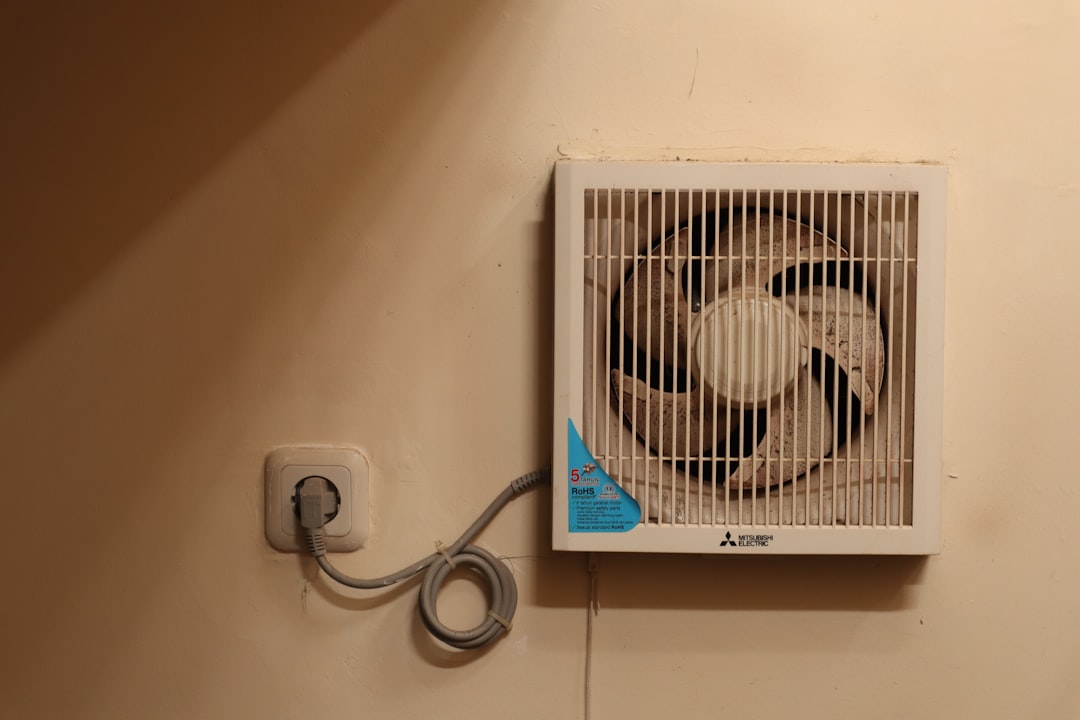
When Your AC Stops Being Your Best Friend
AC not cooling issues are among the most frustrating problems homeowners face, especially during Florida's sweltering summer months. When you're sweating through a sleepless night or dealing with uncomfortable afternoons, you need answers fast.
Most Common AC Not Cooling Problems:
- Dirty air filter - Restricts airflow and forces your system to work harder
- Thermostat issues - Wrong settings or dead batteries prevent proper operation
- Refrigerant leaks - Low coolant levels mean no cold air production
- Frozen evaporator coils - Ice buildup blocks heat absorption
- Dirty condenser coils - Prevents heat release from your home
- Electrical problems - Tripped breakers or faulty wiring stop the system
- Blocked vents or ductwork - Restricts airflow throughout your home
The good news? Many of these issues have simple fixes you can try before calling a professional. Others require expert attention to avoid costly damage to your system.
Over three-quarters of all homes in the US have air conditioners, and they all work on the same basic principle: removing heat from inside your home and releasing it outside. When this process breaks down, your comfort disappears quickly.
Whether you're dealing with warm air blowing from vents, strange noises, or a system that won't turn on at all, this guide will help you identify the problem and decide if it's a DIY fix or time to call in the pros.
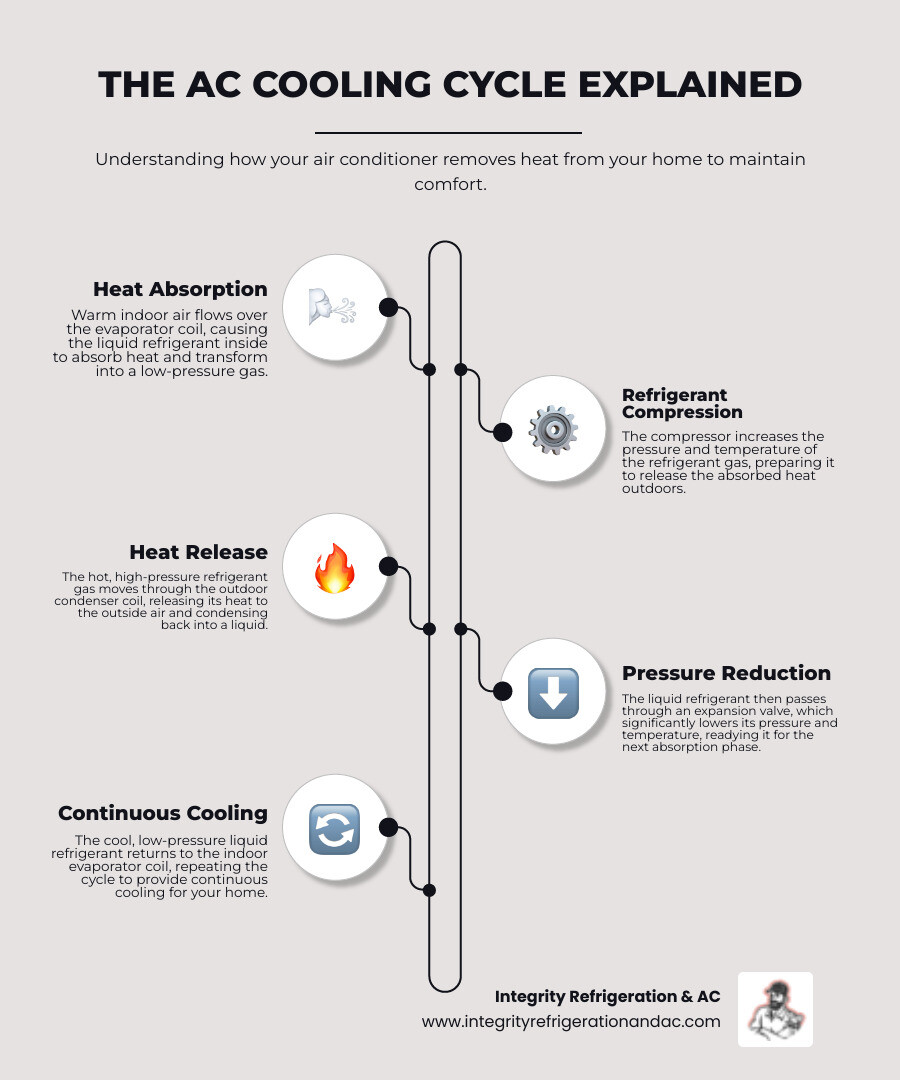
Start Here: Simple Checks Before You Call a Pro
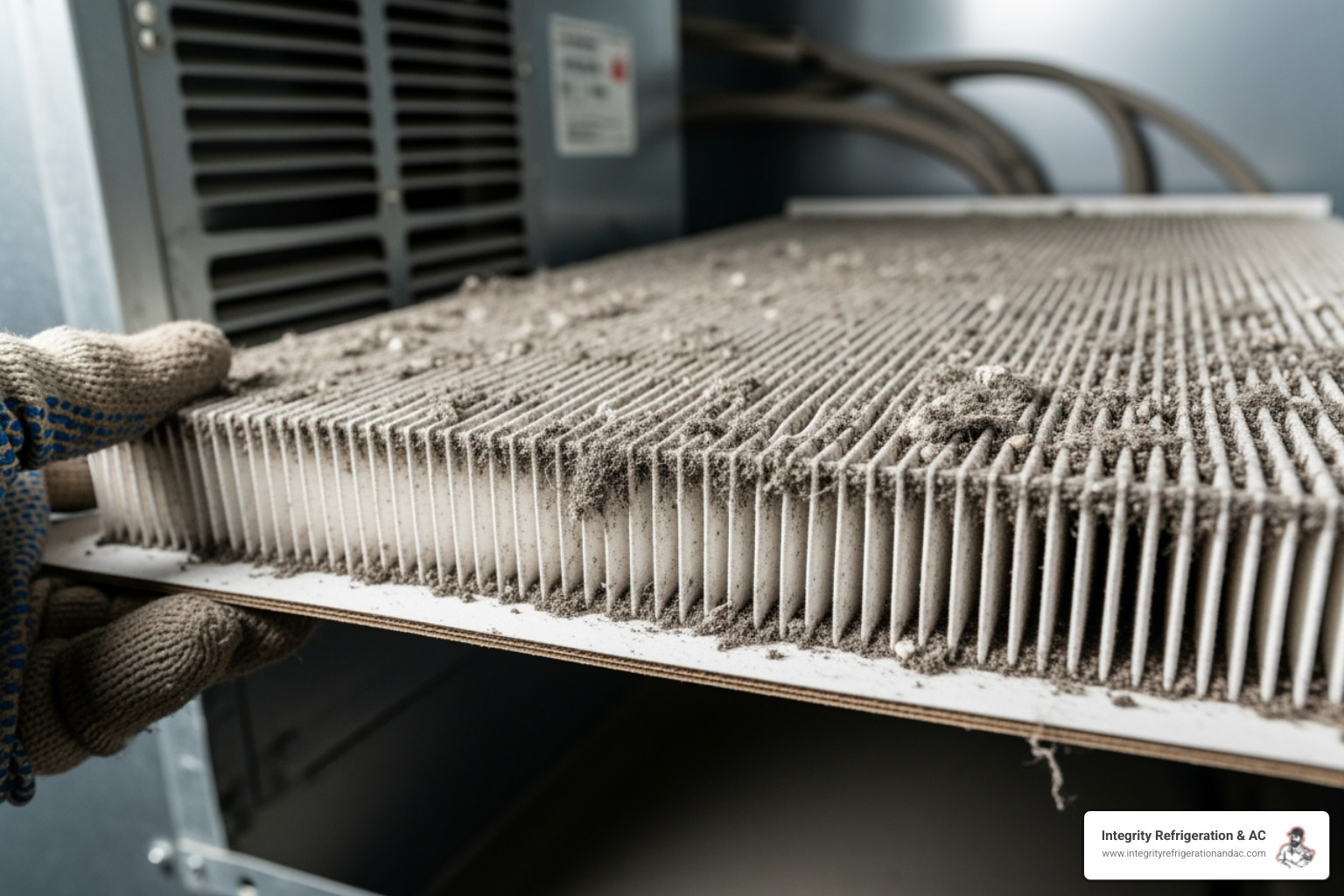
When your home feels like a furnace, don't panic. Many AC not cooling issues have simple solutions you can tackle yourself. Many service calls can be avoided with these quick checks. Before spending money on a technician, give these a try.
Check Your Thermostat Settings
Over half of our "emergency" calls are simple thermostat issues. Settings can be accidentally changed, or a new smart thermostat might act up.
Start with the basics. Make sure your thermostat is in "Cool" mode, not "Heat" or "Fan Only." Then, check that your target temperature is lower than the current room temperature. If you've set it to 75 degrees and your home is already 72, your system is doing exactly what you asked.
Also check your fan setting. If it's set to "On," the fan runs constantly, sometimes blowing warm air. Switch it to "Auto" so the fan only runs when your system is actively cooling.
If your thermostat uses batteries, try replacing them. For smart thermostats, a complete reset can help. Turn off the thermostat, flip the AC unit's breaker off for five minutes, then restore power.
Inspect and Clean Your Air Filter
A clogged filter is the most common, and preventable, cause of AC not cooling issues. It's like your AC trying to breathe through a thick blanket.
A dirty filter reduces airflow and forces your system to work overtime, leading to poor cooling performance, higher energy bills, and system breakdowns. In extreme cases, it can cause your evaporator coils to freeze solid.
Check your filter monthly and replace it every one to three months, more often if you have pets or live in a dusty area. Signs of a clogged filter include weaker airflow from vents, uneven cooling, more dust, or ice on your indoor unit.
Replacing the filter is usually simple: turn the system off, slide out the old filter, and insert the new one, making sure the airflow arrow points in the right direction.
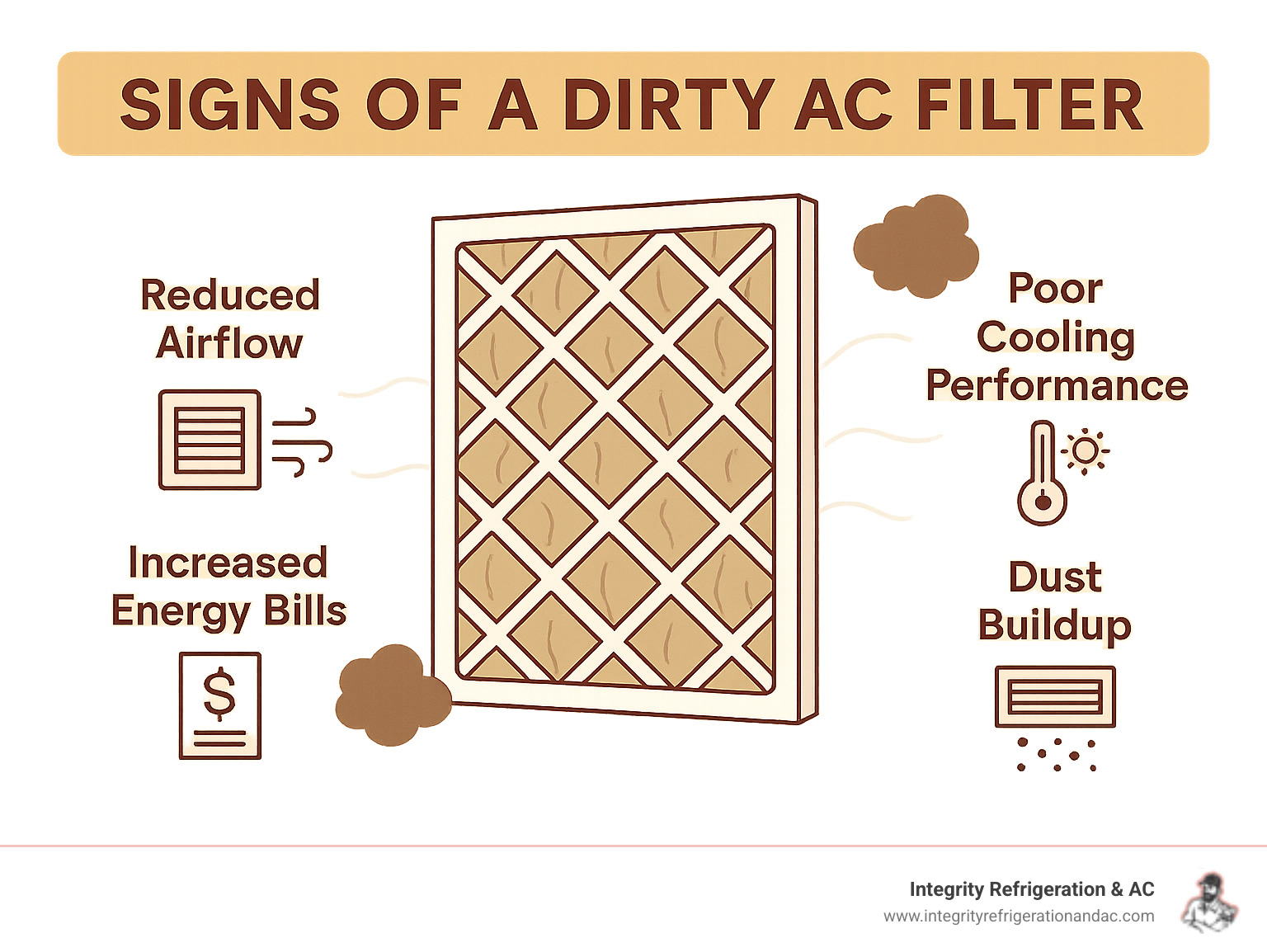
Look for Tripped Breakers or Blown Fuses
Your AC system draws serious power. Electrical surges or Florida's storms can trip a breaker, cutting power to your cooling system.
Go to your main electrical panel and look for breakers in the "off" position. If you find one, flip it completely to "off," then firmly back to "on." Wait a few minutes before restarting your AC.
Also check the safety shut-off switch near your outdoor condenser unit. This switch, in a small box on your exterior wall, can get flipped accidentally. Ensure it's "on."
If these steps don't restore power, you likely have a more complex electrical issue. For safety, it's time to call professionals.
Diving Deeper: Common AC Not Cooling Issues and Their Causes
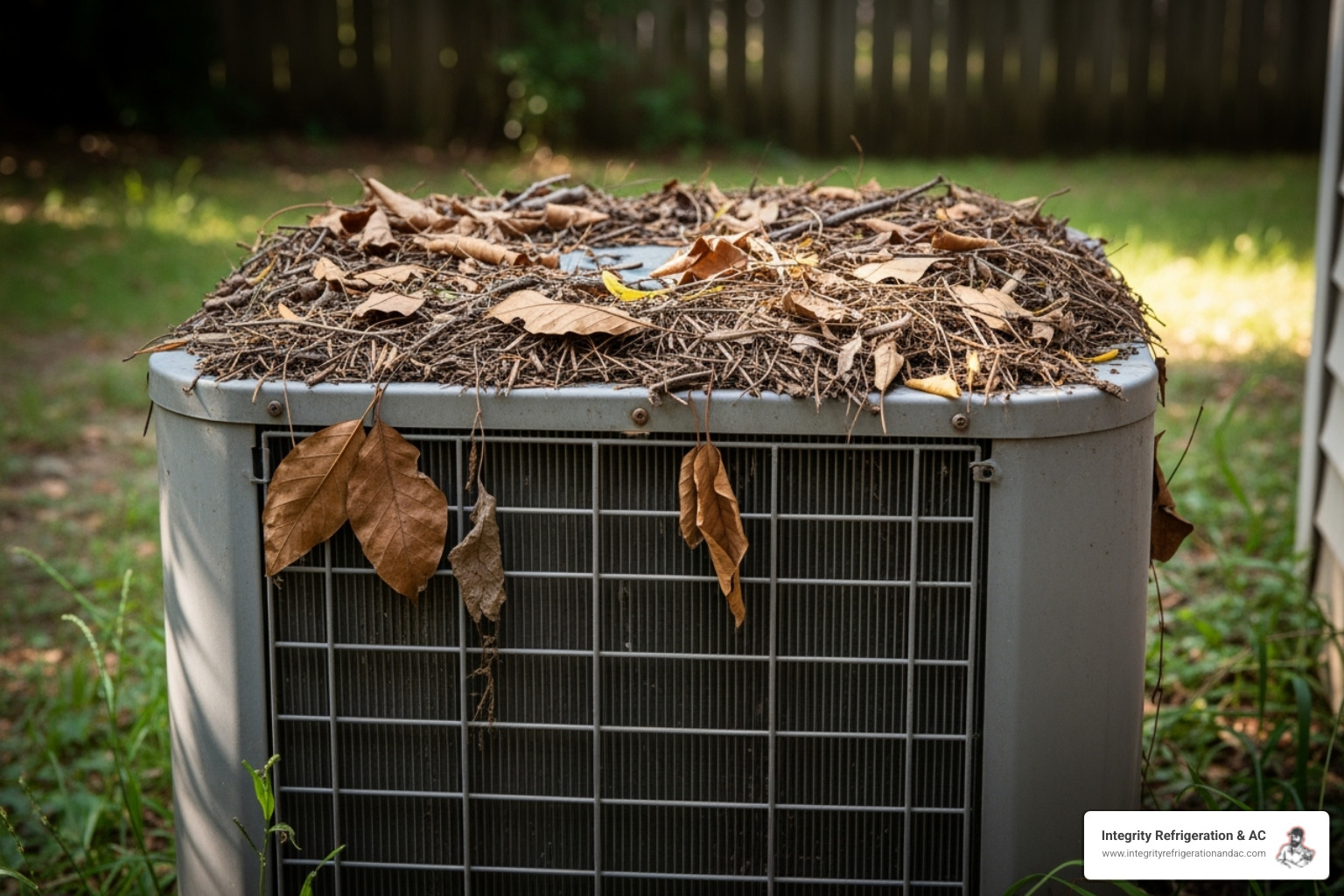
If you've checked the basics and your AC still isn't cooling, it's time to explore trickier culprits behind AC not cooling issues. These problems typically need professional attention, but understanding what might be wrong helps you communicate better with your HVAC technician.
Refrigerant Leaks: A Common Culprit for AC Not Cooling Issues
Refrigerant is essential to your AC; it absorbs heat from your home and moves it outside. Without enough refrigerant, your AC can't cool properly. It's important to know that refrigerant doesn't get "used up" like gas. An AC is a closed-loop system, so if you're low on refrigerant, you have a leak.
Suspect a leak if you notice warm air from your vents, hissing or bubbling sounds near refrigerant lines, ice on the copper lines, or oily residue around AC components.
Refrigerant leaks are not a DIY project. The chemicals require special handling, and releasing them is illegal. A professional will locate and repair the leak, then add the correct amount of refrigerant. Simply "topping off" the system without fixing the leak is a temporary and costly mistake.
Frozen Evaporator Coils
Frozen evaporator coils look like a block of ice inside your AC unit. This coil, located in your indoor air handler, absorbs heat from your indoor air. When it's covered in ice, it can't do its job. You'll notice drastically reduced airflow and water dripping as the ice melts.
The most common causes are restricted airflow (from a dirty filter or blocked vents) and low refrigerant. A failing blower motor can also be the culprit.
If you find frozen coils, turn off your AC but leave the fan running to help melt the ice, which can take several hours. Check your air filter and ensure all vents are open. Once thawed, try restarting the system. However, if the coils freeze again, you need professional help. Running an AC with frozen coils can damage your compressor, an expensive component to replace.
Dirty or Blocked Outdoor Condenser Unit
Your outdoor unit is where heat from inside your house gets released. The condenser coil inside works like a car's radiator and needs to stay clean to work properly. When caked with dirt, leaves, or grass clippings, it can't release heat efficiently, forcing your system to work harder.
This is common after storms or during high pollen seasons. Pet hair and cottonwood fluff can also clog the coil fins.
Keep at least two feet of clearance around your outdoor unit. Regularly clear away debris. You can gently rinse the coils with a garden hose (turn off the power first). For heavy buildup, professional coil cleaning is recommended.
Leaky or Blocked Ductwork
Your ductwork is the delivery system for your cool air. If there are problems with your ducts, the cool air won't reach every room. Air leaks from gaps or loose connections are common and wasteful, sending cool air into your attic or walls.
Sometimes the issue is simple, like blocked registers or return vents from furniture or rugs. A common mistake is closing vents in unused rooms, which creates pressure imbalances and reduces efficiency. Keep all vents open.
Dirty ducts can also reduce airflow and impact air quality. If you notice dust from vents or a musty smell, your ducts may need professional cleaning. If you have uneven cooling, it might be time for a professional duct inspection.
Maintenance, Repair, or Replacement? Making the Right Call
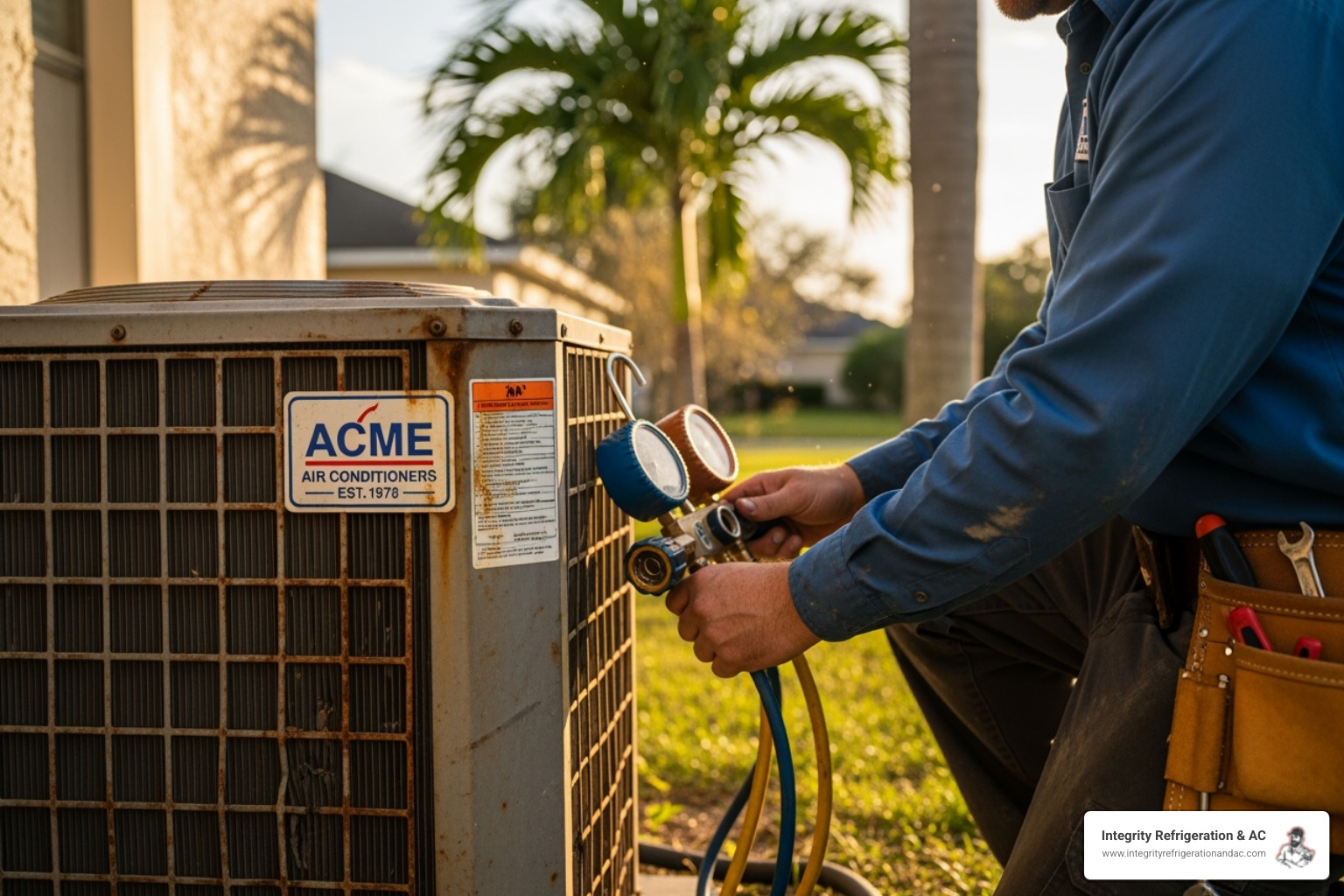
When dealing with AC not cooling issues, a big question is whether to repair or replace. In Florida, where an AC is essential for home comfort, this is a critical decision. The answer depends on your system's age, condition, and the cost of repairs.
Signs Your AC Unit is Old and Needs Replacement
Air conditioners aren't built to last forever. Most central AC units perform well for about 10 to 15 years. After that, they begin showing their age with more than just simple AC not cooling issues.
Frequent breakdowns are a major red flag. If you're calling for repairs multiple times a season, the costs can add up quickly. Rising energy bills are another sign, as older units lose efficiency.
If your system uses R-22 refrigerant ("Freon"), it's outdated and has been phased out. This refrigerant is expensive and hard to find, making replacement a more sensible option if a leak occurs. If a major component like the compressor fails on an older unit, the repair cost can be close to the price of a new unit, making replacement the obvious choice.
The Importance of Regular Maintenance
Most AC not cooling issues are preventable with proper maintenance. Much like a car needs oil changes to run well, your AC needs annual tune-ups to prevent surprise breakdowns.
During a maintenance visit, a technician looks for small problems before they become big ones. They clean coils, check refrigerant levels, and inspect electrical connections. Preventative maintenance keeps your system running efficiently, lowers energy bills, and extends its lifespan. Catching issues early is almost always less expensive than an emergency repair call.
Risks of Running a Faulty Air Conditioner
When money is tight, it's tempting to ignore an AC that's "mostly working." However, ignoring AC not cooling issues can cost you more in the long run.
Compressor damage is the biggest risk. The compressor is the heart of your AC and the most expensive part. A struggling system overworks the compressor, leading to failure. A faulty AC also causes energy waste, spiking your utility bills.
Water damage is another risk. Frozen coils that melt or clogged drain lines can lead to leaks, damaging ceilings and floors and promoting mold growth. Finally, a malfunctioning AC can't properly dehumidify your air, hurting your indoor air quality, which is a major concern in Florida's humid climate.
Frequently Asked Questions about AC Cooling Problems
When your air conditioner acts up, you likely have many questions. Here are the straight answers to the most common questions we hear about AC not cooling issues.
Should I turn my AC off if it's not cooling?
Yes, absolutely turn it off. This is the most important thing to do. While it feels counterintuitive, continuing to run a malfunctioning AC can cause more damage. Running a faulty AC is like driving a car with a flat tire—you're causing more harm. Issues like refrigerant leaks or restricted airflow can cause evaporator coils to freeze solid. This puts tremendous strain on the compressor, which is very expensive to replace. You're also wasting electricity. Turn it off and begin troubleshooting.
How do I reset my central air conditioning unit?
Sometimes your AC just needs a reboot, like a computer, to clear minor electrical hiccups.
Start with your thermostat and set it to "Off." Next, go to your electrical panel and find the breaker for your air conditioner (often labeled "AC" or "HVAC").
Turn the breaker completely off for at least five minutes. This allows the system's internal controls to fully reset.
Flip the breaker firmly back to "On," then return to your thermostat and set it to "Cool." Give the system a few minutes to start its cooling cycle. If it still doesn't cool, the problem likely needs professional attention.
Why is only one room in my house not getting cool?
It's a common and frustrating problem when one room refuses to cool down.
Check your vents first. Ensure both supply and return vents are open and not blocked by furniture, curtains, or rugs.
Check the door. If a door is always closed, it can trap air. Cool air needs to circulate, so even a small gap under the door helps.
Leaky ductwork is another common culprit. If ducts leading to the problem room are damaged or have loose connections, the cool air is lost before it reaches the room.
Some rooms are naturally harder to cool due to factors like sun exposure or poor insulation. If simple checks don't solve the problem, you may need a professional to inspect your ductwork and airflow.
Get Your Cool Back for Good
Dealing with AC not cooling issues can quickly turn your Florida home into a sweatbox. We've covered everything from simple thermostat checks to complex refrigerant leaks to help you find answers.
The reality is that some problems have quick DIY fixes, like changing a dirty air filter or resetting a tripped breaker. Others, such as refrigerant leaks or frozen evaporator coils, need professional expertise to avoid costly damage.
If you've tried our troubleshooting steps and are still sweating, it's time to bring in the cavalry. At Integrity Refrigeration & AC, we've seen every type of cooling crisis across Winter Haven, FL, and Polk County. Whether you're in Davenport, Lakeland, or Auburndale, we understand how miserable the Florida heat can be when your AC fails.
Unexpected AC not cooling issues are never convenient for your budget. That's why we offer flexible financing options. Quality comfort shouldn't break the bank. Our goal is to ensure you can afford the necessary repair or replacement without the financial stress of emergency HVAC work.
Don't spend another night tossing and turning. We're here to restore your comfort with the integrity and expertise our name represents.


